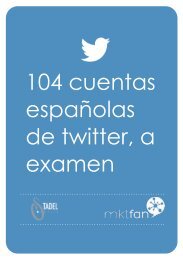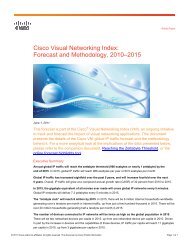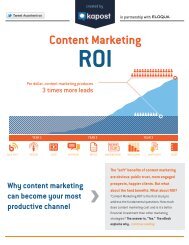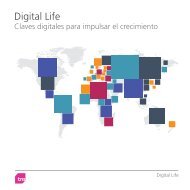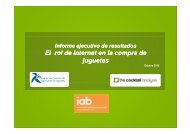Open Innovation 2.0 Yearbook 2013 - European Commission - Europa
Open Innovation 2.0 Yearbook 2013 - European Commission - Europa
Open Innovation 2.0 Yearbook 2013 - European Commission - Europa
Create successful ePaper yourself
Turn your PDF publications into a flip-book with our unique Google optimized e-Paper software.
‘smart specialisation platform’ supports regions<br />
and Member States in better defining their research<br />
and innovation strategies. As there is no ‘one-sizefits-all’<br />
policy solution, the new facility helps the<br />
regions to assess their specific research and innovation<br />
(R & I) strengths and weaknesses and build<br />
on their competitive advantage. This is, for the<br />
regions, another step on the path to achieving the<br />
objectives set by the Member States in the field of<br />
research and innovation as part of the Europe 2020<br />
strategy.<br />
<strong>European</strong> Network of Living Laboratories<br />
Since the Finnish EU Presidency in 2006 [21], the EU<br />
presidencies have promoted open, ecosystem-based<br />
human-centric RDI in real-life contexts such as living<br />
laboratories that engage people. Currently, the<br />
network has over 300 identified members as urban,<br />
regional, public service or industrial reform-driven<br />
living laboratories in Europe [22] and globally. The<br />
network started its operations by identifying competitive<br />
open RDI ecosystems for solving major societal<br />
challenges of our time such as well-being, energy<br />
efficiency, smart city development and participative<br />
media. However, the next big challenge is to develop,<br />
across borders, the network efficiency that is needed<br />
for scalability of pre-market research and innovation<br />
for entrepreneurship. This includes institutional, leadership,<br />
funding and other network-efficiency-related<br />
challenges. Furthermore, if this is done successfully,<br />
this network may fundamentally boost the internationalisation<br />
of new services, businesses, firms and<br />
industries. This also means not only solving the major<br />
societal problems in Europe but also boosting single<br />
market development.<br />
Currently, the <strong>European</strong> Network of Living Labs<br />
(ENoLL) is experimenting in providing <strong>European</strong><br />
network efficiency in RDI across borders for entrepreneurship.<br />
ENoLL members have already piloted<br />
with <strong>European</strong> firms, academia, cities, and citizens,<br />
the network efficiency of RDI methodology and<br />
scalability: this work is carried out through EUfunded<br />
projects such as SAVE ENERGY, Apollon and<br />
Concorde (FI PPP). Based on these experiences, the<br />
network may be capable of developing basic and<br />
applied research methodologies for experimentation<br />
and piloting at large scales in real life. The<br />
potential of <strong>European</strong>-wide RDI networks should<br />
be taken into account when developing RDI capacities<br />
for solving societal challenges. There is a need<br />
to strengthen the consequent RDI infrastructure<br />
and research and education — even in universities.<br />
Students would be a fantastic resource to ‘put<br />
into action’ and learn how to conduct ‘hands-on’<br />
RDI with people in order to make the world a better<br />
place in which to live.<br />
Distributed leadership for<br />
shared value creation<br />
Collaborative RDI means distributed leadership that<br />
is based on trust and shared responsibilities among<br />
people, firms and public agencies. Nonaka and<br />
Takeuchi [23] argue for prudent distributed leadership<br />
where wisdom is embedded in every individual<br />
practice and action. This means capabilities such as<br />
competence in grasping the essence of a problem<br />
and knowing how to draw general conclusions from<br />
random observations and mastering, as a craftsman,<br />
key issues of the moment and acting on them immediately.<br />
This also implies that values such as beauty,<br />
goodness and truth are applied, tested and recreated<br />
together in every action — not put on others. This<br />
inspires people to create and apply high-level values<br />
and aspirations as well as bonds that sustain collaborative<br />
action. This may contribute to what Michael<br />
Porter [8] discusses as a need for shared value creation.<br />
In collaboration, firms, academia, public agencies<br />
and people bridge economic and social cliffs<br />
that, according to Porter, exist due to the presumed<br />
trade-offs between economic efficiency and social<br />
progress. The shared value creation involves creating<br />
economic value in a way that also creates value for<br />
society by addressing its needs and challenges [8].<br />
We believe that collaborative RDI around the major<br />
societal challenges of Europe’s social and economic<br />
foundations brings about major social and economic<br />
transformative innovations with entrepreneurial<br />
spirit and activities, jobs and growth that<br />
by their very DNA deploy collaboration for shared<br />
value creation.<br />
References<br />
[1] <strong>European</strong> <strong>Commission</strong> (2010), Communication from<br />
the <strong>Commission</strong> to the <strong>European</strong> Parliament, the Council,<br />
the <strong>European</strong> Economic and Social Committee and<br />
the Committee of the Regions, Europe 2020 Flagship<br />
Initiative — <strong>Innovation</strong> Union, COM(2010) 546 final of<br />
6 October 2010.<br />
[2] Barroso, J. M (2011), <strong>Innovation</strong> Priorities for<br />
Europe, Presentation by the President of the <strong>European</strong><br />
<strong>Commission</strong> to the <strong>European</strong> Council of 4 February 2011<br />
(http://ec.europa.eu/europe2020/pdf/innovation_en.pdf).<br />
[3] <strong>European</strong> <strong>Commission</strong> (2011), <strong>Innovation</strong><br />
Union Competitiveness Report 2011, Executive<br />
Summary (http://ec.europa.eu/research/<br />
innovation-union/index_en.cfm?pg=executivesummary§ion=competitiveness-report&year=2011).<br />
[4] <strong>European</strong> <strong>Commission</strong>, Eurostat, R & D Expenditure,<br />
Data from September 2010.<br />
[5] R & D (2012), ‘2012 Global R & D Funding<br />
Forecast: R & D Spending Growth Continues While<br />
Globalization Accelerates’ (http://www.rdmag.com/<br />
articles/2011/12/2012).<br />
47



